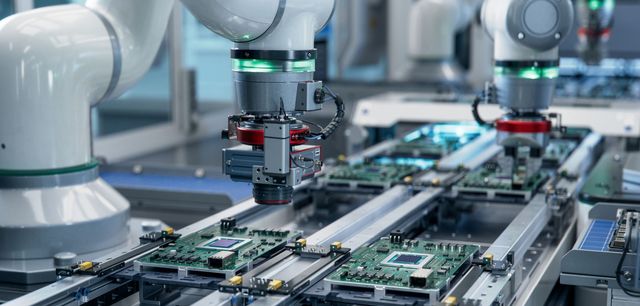12 June 2025
With the European Chips Act, adopted in 2023, the EU is seeking to promote the semiconductor industry in Europe and to do its utmost to prevent supply bottlenecks like those which hit at the beginning of the coronavirus crisis. In line with this intention, new chip factories are also planned in Germany. However, two major projects have now been halted. Why is progress proving slower than planned in Europe’s biggest economy? Under what conditions will semiconductor manufacturers in Germany be able to produce competitively? We discussed these questions with Holger Krumme from ALTER | HTV, a subsidiary of the TÜV NORD GROUP, whose work includes the testing and programming of semiconductors.
Mr. Krumme, with Wolfspeed in Saarland and Intel in Magdeburg, two large chip factories planned for Germany have either been shelved or had their construction postponed. What are the reasons for this?
Holger Krumme: Both cases have to do with economic problems on the part of the manufacturers, so we’re not talking here about a blanket decision against Germany as a production site. So, while Intel called a temporary halt to the construction of the factory in Magdeburg last year, it did at the same time announce that it would make a final decision on the project in 2026.
Meanwhile, progress is being made with the factory of Taiwanese manufacturer TSMC in Dresden. Why is everything going according to plan here?
TSMC is the world’s largest semiconductor contract manufacturer and supplies almost all the major chip companies – from Apple to Intel to Nvidia. This means that the company is very well positioned economically and, due to the burgeoning conflict with China, is also very interested in setting up semiconductor production outside Taiwan.
The new factory is being built in the area known as Silicon Saxony in and around Dresden. What role does local infrastructure play in the choice of site?
Short distances are clearly a great advantage when it comes to exchanging information – for instance, with the aim of finding solutions promptly if problems arise in production. And manufacturers like TMSC or Infineon can also find the appropriate specialists locally, as the universities there are responding to the demand and providing more training in the sought-after fields.
Germany wants to build a new chip industry. But things are going more slowly than expected. Why is that?
In my view, there’s been far too much focus on a few large companies. Incomers like TSMC in Dresden are important and will also generate a fair bit of production. But in principle, we should set our sights more broadly in Germany: The principal need in this country isn’t for high-end processors and AI chips, but for special chips for automotive manufacturing, the defence industry, power supply and renewable energies. German companies are doing well in these areas and making a profit. And the shortage of these kinds of semiconductors was actually the real problem in the chip crisis.
Which is why we should put more of the funding freed up by the suspension of major projects into medium-sized companies like these. Although they produce smaller quantities than the large corporations, their specific customer base means that they’re also exposed to less market and competitive pressure. The problem, however, is that getting subsidies in Germany forces you to leap over some very high hurdles. You have to be part of a consortium and submit funding applications for highly innovative concepts, sometimes with very tight deadlines. This often isn’t feasible for small and medium-sized companies. Instead of limiting ourselves to such highly innovative approaches, we should therefore extend funding to existing technologies that have already proven themselves on the market.
What framework conditions does the industry need to be able to produce economically in competition with Asia and the US?
One key aspect is the supply chains. We need companies that can deliver all the process steps involved in semiconductor production. In Germany and Central Europe, for example, we’re seeing a frenzied quest for suppliers of packaging – by which I mean companies that insert chips into housings. We at ALTER | HTV have some capacities internally, but these are far from sufficient to meet the huge demand. And flying the chips to Asia for packaging is of course neither economical nor sustainable. Spain, which is currently investing heavily in the expansion of its semiconductor industry, is therefore funding the entire value chain in the semiconductor sector. Germany hasn’t yet followed suit, but to do so would give us a crucial lever to strengthen the industry.
So, what specifically do we need to improve in Germany?
Generally speaking, we’re still very strong in research in this country. In the past, however, we’ve often found it difficult to translate good and innovative ideas into economically viable production. We have to do better in this regard. And this won’t happen in the semiconductor sector without strong government support that’s free of red tape. In the US and China, hundreds of billions of euros are being spent. Taiwan, Japan and South Korea are also subsidising their domestic industry with billion-dollar programmes on a similar scale. If we Europeans don’t want to fall further behind here, let alone make up lost ground, then we’re going to need to make comparable efforts.
About Holger Krumme
Holger Krumme is CEO of ALTER I HTV. The graduate electronics technician and electrical engineer’s achievements at the TÜV NORD GROUP subsidiary include helping to develop a special preservation process for semiconductor chips.

